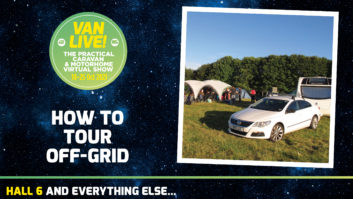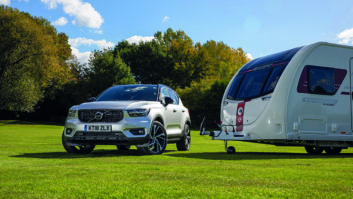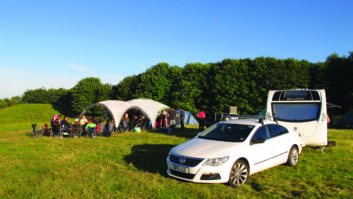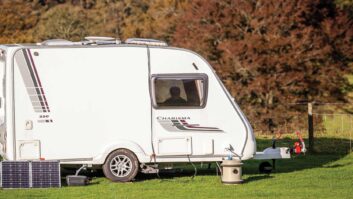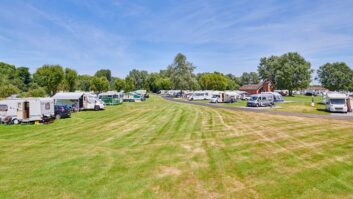While heading to a big site with plenty of facilities and electric hook-up can be an incredibly tempting choice, caravanning off-grid and pitching up at a smaller campsite can have its own unique charm.
After all, the best caravan sites don’t always have to offer amazing facilities. It’s not always possible to get the required planning permission to build too much in the way of amenities in some of the country’s most picture-perfect locations. This is why you can typically find smaller campsites with more limited facilities in such spots.
These compact sites will make you have to use your van’s own facilities but it’s the lack of amenities that you will find on-site that can make taking a caravan off grid so appealing.
As we start to get our tourers out of storage and carry out those pre-season maintenance tasks such as cleaning a caravan, many of us will be planning where to head on our holidays – why not try going off-grid? Here, I explain exactly what it is, why you should try it, and also share my top tips to help you get the most from an off-grid tour.
Caravanning off-grid: what you need to know
What is off-grid caravanning?
Why should I go off-grid in my caravan?
Off-grid tips
What is off grid caravanning?
Off-grid caravanning is simply camping without using electric hook-up, that one little ‘essential’ that ties us to formal sites, often in developed locations.
In most cases, the small campsites associated with off-grid camping do not offer facilities such as toilets, showers, shops or cafés. You really need to be self-sufficient, using your caravan’s excellent washroom and kitchen, and stocking up enough to avoid regular visits to shops, which will probably be some distance away.

Caravanning off-grid, however, should not be confused with wild camping, when you pitch your van wherever you like – anywhere from a lay-by or rural roadside to a farmer’s gateway – which in the UK is very likely to be illegal.
People often conflate these two activities, but they are different, and off-gridding is usually on organised campsites or private land (with the owner’s agreement). The difference between this and hooked-up camping can still be dramatic. Here’s why…
Why should I go off-grid in my caravan?
Peace and quiet is one of the many other benefits of caravanning off-grid, not only because you may well be in the middle of nowhere, but also because with five pitches or fewer, there won’t be many other campers and caravanners around. Typically, small sites attract fewer families with children, too.
Staying on a small site without lots of facilities has environmental advantages, but bear in mind that some off-gridding locations don’t allow for the disposal of certain toilet chemicals, something to bear in mind when you’re choosing the best caravan toilet chemical for your tourer.
When you stay at a great small site that few people know about, you often get a pleasing sense of exclusivity (and a certain justified smugness!).
Remote small sites can deliver the most astonishingly dark night skies. With no light pollution, all the stars will be visible on cloudless nights. The only time I’ve been able to witness the awesomeness of the universe in recent years was on a remote site in Norfolk.

Putting yourself in the heart of the countryside is ideal for nature lovers and twitchers. On some small sites, you don’t even need to leave your van to see nature in action. Why not research some amazing murmurations, and then camp nearby?
As our off-grid guru Rod Farrendon explains: “We rarely touch our car once we’re on site. As long as we have all the supplies we require, there’s no need to leave the campsite by car at all.”
For those who enjoy caravanning with a dog, off-gridding has its benefits too.
Surveys have shown that more than 60% of caravan owners also keep dogs. This can make small, off-grid sites the perfect choice for owners who are looking for dog-friendly caravan sites to pitch up at, as they combine plenty of space and freedom to roam with easy access to the countryside and more flexible pet rules than many of the bigger sites. Both major touring clubs have excellent networks of affiliated small campsites, known as Certificated Sites (C&CC) and Certificated Locations (CAMC).
In fact, the CAMC announce its Certificated Location of the Year each year, with the most recent results coming in October 2024.

Rod adds: “Generally, off-grid sites are perfect for dog-owners, too. The rules on small sites are often more flexible for well-behaved dogs, and being in the middle of the countryside means we have all the walks we need, directly from the campsite.”
Typically, these places will provide five pitches or fewer and for that reason, you’ll often find them tucked away in the most enchantingly scenic settings.
Angling is popular with caravanners, and small remote campsites can put you within easy reach of some excellent angling spots.
Camping off-grid means you are often in perfect locations for hiking, road cycling and mountain biking. And there’s less need to drive to local destinations.
Unlike bigger, more prescriptive sites, you’ll have some freedom to pitch your tourer in a position to suit you and make the most of the sun and the view.

Off-grid sites tend not to have clearly marked pitches, giving you the possibility of spreading out and using the best caravan awning, outdoor area, and a pup tent.
Where you’ll spend £20 to £50 per night on a full-service site, off-grid pitches are often attainable for £10 to £20. That means more cost-effective trips and longer stays too, ideal if you’re caravanning on a budget.
Off-grid groups are a close-knit bunch who enjoy the camaraderie of this more basic caravanning, and are happy to help each other out if there are problems.
Top tips for caravanning off-grid
To off-grid successfully, you have to prepare, and you might also need to make a few considered purchases. Here are our expert tips for enjoyable off-gridding:
1. When you’re looking for the best caravan leisure battery, pick one that is a high-amperage to ensure that you have light and ancillary power for the duration of your break.
If it will fit in your battery compartment, a quality 110Ah battery is recommended, if not a lithium leisure battery if you have the budget for it. Serious off-gridders will often link two leisure batteries to double their longevity.

Aim to keep your battery topped up at all times. Ideally, it shouldn’t drop below 75% charge. Repeatedly discharging the battery to 50% or lower could cause permanent damage. A 12V leisure battery is at full charge when the control panel voltmeter displays 12.7V.
At 12.4V it’s around 75% charged, and when the display says 12.2V, it’s at 50% charge. To avoid damage, recharge it at that point or sooner. In contrast, a lithium unit will be fully charged at 13.3-13.6V, with 12V meaning there’s only 20% of the charge left. Lithium batteries can be discharged further than their lead-acid counterpart without causing damage.
2. Knowing how to power a caravan off-grid will be a crucial part of an enjoyable experience.
In summer, you can keep your leisure battery topped up with a ‘trickle’ charge from a solar panel system. Remember, you don’t need hot weather, as photovoltaic solar panels generate electricity from light, not heat. Mind you, in winter as the days get shorter, your panel will be charging less effectively.
You may find yourself asking “what size solar panel do I need for a caravan?“. Well, we’d say a 150-200W caravan solar panel, with a charge controller (all panels over 18W need one), should be sufficient to keep your leisure battery topped up in summer. These can be fitted to the roof of your caravan, or freestanding. The first is a fit-and-forget option, while the latter will have to be set up on your pitch and, ideally, moved to face the sun throughout the day.
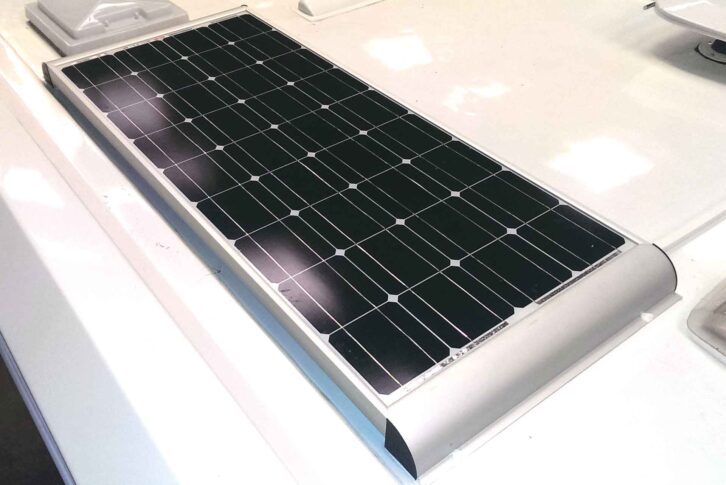
In the summer, remember to angle your panels to catch the early morning sun, before you settle down for the night.
Select a panel with IEC 61215 quality certification, from a dealer offering a good warranty. We recommend purchasing a maximum power point tracking controller, which can extract up to 20% more power from your solar panel.
Don’t miss our guide to installing caravan solar panels if you’re thinking of getting some, either.
3. Even with a solar panel, you’ll need to be careful with the power consumption from your leisure battery. You will soon learn which devices can be used, and how often.
If you have a caravan microwave, remember, you won’t be able to use it off-grid, and you’ll be restricted with other items of kit, too.
4. Always make sure to take sufficient gas for your break. When you are off-grid, you’ll be using gas to heat your water and the ‘van, cook meals and even cool the fridge, so during hot and cold weather your usage can soar. Seasoned off-gridders often take two gas bottles with them.
“I take a 10kg and a 7.5kg Safely gas bottle,” says Rod. “I also take an empty Calor Lite bottle, just in case I have any problems filling up my Safefill canisters.”
Consider a self-fill gas system such as Safefill or Maslow if you’re a heavy gas user too. This means you can fill the bottles with Autogas on petrol station forecourts, and it’s typically only 30% of the cost that a prefilled bottle of Calor gas.
5. Propane gas is the sensible option for off-gridders who camp during colder weather. Propane evaporates down to minus 42°C – low enough to work if you’re caravanning in winter at colder temperatures – while butane stops evaporating at around minus 2°C – a high enough temperature for ‘gassing’ to stop in typical UK winter weather.
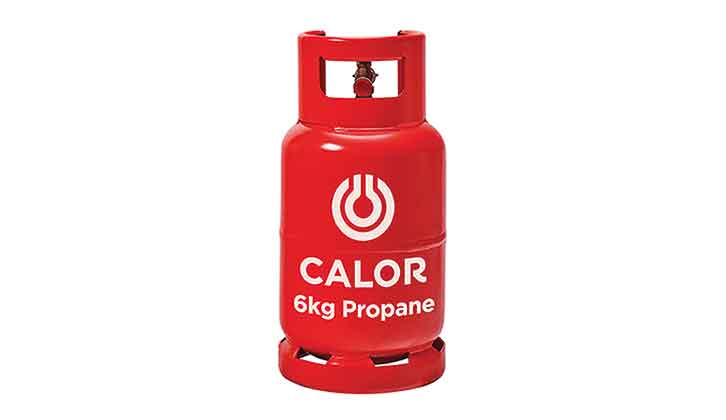
6. It’s important to know your caravan weights before packing up your van. Bear in mind that adding the solar panel, a second battery and an extra gas bottle to your caravan could easily eat up 40kg of your payload allowance, so keep track.
7. Consider making greater use of hand sanitiser, rather than constantly washing your hands and triggering the water pump and heater every time that you turn on a tap.
Caravans quickly get toasty in winter, so take care not to overheat the interior. Try dressing more warmly and keeping an eye on the central caravan heating setting.
On cooler spring and summer evenings, a fire pit can keep you warm outside and lessen your need to run the heating.
Taking a morning shower will give the power system all day to recharge.

When it comes to kitting out your caravan for an off-grid adventure, there are plenty of 12V appliances available. You can buy toasters, kettles and so on from accessory shops or online. Bear in mind that they don’t work quite as quickly as their 230V equivalents; some people prefer to use the gas grill and hob.
If you enjoy good walks when you’re off-grid in your caravan and are worried about walking mud back into your tourer, there are also 12v options available among the best vacuum cleaners for a caravan, which can help you keep on top of the grime in your van’s interior.
8. In good weather, you can save plenty of gas by using a charcoal caravan barbecue. “We have a little Bodum Fyrkat barbecue,” says Rod. “It’s a charcoal barbecue in a bucket!”

9. In hot weather, there are ways to keep cool in your van while still conserving power supplies. “We bought two rechargeable six-inch desk fans, which can be recharged via USB cables, for touring in warmer weather,” says Rod.
“They’ll run for around 15 hours on the low setting and about half that on high. We just charge them during the day and use them at night. We put them on the dresser opposite the bed and they make sleeping so much more comfortable in hot weather. They’re fantastic for off-gridding and are a godsend in the summer.”
10. The super serious off-grid caravanner might consider fitting an onboard water tank to their tourer (some top-of-the-range models have them as standard). “It’s like having a second Aquaroll,” says Rod.
11. It’s a good idea to take a large canister of drinking water on your off-grid trips, especially when you are visiting a new site or a tiny rural campsite, where you might be using a farm tap.
Rod takes a slightly different approach: “We use a filter jug to filter our drinking water – we don’t drink it straight out of the tap. I also pop a couple of purification tablets in the Aquaroll each week.”

12. After checking with the site owner, “empty your grey waste in a hedge,” says Rod.
13. Taking your caravan off grid means no full-facility sites with pools and games rooms, so take books, board games and so on to keep the family entertained. Make sure the children take electronic games that don’t rely on Wi-Fi.
14. Similarly, before you travel, download music onto your phone or device, as you might not be able to stream it on-site. If you’re worried about keeping your phone charged up when you’re on tour, Nigel Donnelly has the answer too, as he explains how to keep your phone charged in a caravan when off-grid.
15. We sometimes watch a movie on the laptop in the evening, so we make sure it is fully charged in the daytime, giving the battery plenty of time to replenish before we need the light on in the van.
16. Remember, you probably won’t have access to Wi-Fi – or possibly even a phone signal – on rural off-grid sites. In fact, the better and more beautiful the site, the less likely it is that you will. However, if you want to have access to the internet in a caravan, Mi-Fi devices give you the best chance of getting signal, and can be bought or hired relatively cheaply.
You can also buy Wi-Fi booster systems to fit in your tourer if you want to access Wi-Fi in a caravan, although these are expensive. This can be particularly helpful if you have the best 12V caravan TV and want to stream content on it when pitched up (so long as you have the means of powering it).
Perhaps it’s better to consider off-gridding an opportunity to get away from the ‘mod cons’ that can plague us – instead, why not read a good caravanning book?

17. After wet weather, check the ground before towing onto the site (usually a field). Two wheel-drive tow cars might struggle to pull a caravan over wet grass, mud or other soggy surfaces. Drive carefully and consistently, accelerating and braking with care.
Keep an eye on the weather forecast, bearing in mind that you’ll need to tow the van back off your pitch to reach the nearest Tarmac surface.
On the positive side, there’s likely to be a farmer with a tractor nearby!
18. Asked how he responds to people who think that caravanning off-gridding means roughing it, Rod summarises its unique appeal: “Not at all. There’s nothing we lack that makes it any different to staying on a big Club site. In fact, I feel like we gain. Off-grid sites are in some of Britain’s most spectacular locations and cost a fraction of a campsite providing full facilities. What’s not to like?”
For those who really enjoy peace and quiet on tour, heading to one of the best adults only caravan sites could be worth considering too – these campsites all offer relaxing and tranquil settings.
Don’t miss my 19 tips for getting the most from an off-grid getaway either.
Future Publishing Limited, the publisher of practicalcaravan.com, provides the information in this article in good faith and makes no representation as to its completeness or accuracy. Individuals carrying out the instructions do so at their own risk and must exercise their independent judgement in determining the appropriateness of the advice to their circumstances. Individuals should take appropriate safety precautions and be aware of the risk of electrocution when dealing with electrical products. To the fullest extent permitted by law, neither Future nor its employees or agents shall have any liability in connection with the use of this information. You should check that any van warranty will not be affected before proceeding with DIY projects.
If you’ve enjoyed reading this article, why not get the latest news, reviews and features delivered direct to your door or inbox every month. Take advantage of our brilliant Practical Caravan magazine SUBSCRIBERS’ OFFER and SIGN UP TO OUR NEWSLETTER for regular weekly updates on all things caravan related.
Small campsites associated with off-grid camping do not usually offer facilities. You really need to be self-sufficient



